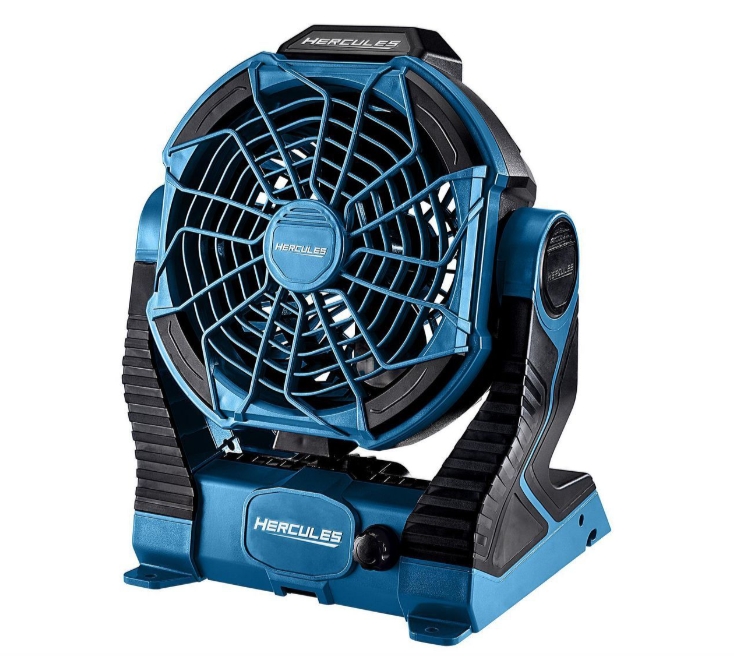
HERCULES 20V/120V Cordless Dual Power Jobsite Fan – Tool Only
- The HERCULES™ 20V/120V Dual Power Jobsite Fan is compact and easy to carry to the jobsite. This high-efficient fan moves up to 300 CFM for a cool work area. Designed for use with a 20V HERCULES Battery, this fan can also be powered by a 120V extension cord.
- Variable speed control with 7-1/4 in. blade diameter delivers air flow up to 300 CFM with airspeed up to 11 MPH
- 120° adjustable fan head for multiple airflow directions
- Compact lightweight design with built-in carrying handle for easy portability
- Durable high impact housing for long-lasting performance
- Multiple use options including freestanding, mounting holes, and integrated hook
$24.99
Last summer nearly melted me. I was refinishing my deck in 95-degree heat when my ancient box fan finally gave up the ghost with a sad whimper and a puff of electrical smoke. That’s when I knew it was time to invest in something that could actually stand up to serious work conditions. After weeks of research and testing, I became something of a portable fan expert—particularly when it comes to the Hercules line. If you’re considering a Hercules Fan for your workshop, job site, or home projects, I’ve compiled everything I’ve learned to help make your decision easier.
Let me tell you, finding the right heavy-duty fan can make the difference between a productive day and a miserable one. I’ve been there, and I’m hoping this guide saves you from the sweat-soaked t-shirts and frustration I experienced before making the switch.
What Exactly Is a Hercules Fan and What Makes It Special?
Hercules Fans are part of Harbor Freight’s professional-grade tool line designed specifically for contractors, serious DIYers, and anyone who needs reliable equipment in demanding environments. When I first encountered one at my buddy’s workshop, I was immediately struck by how different it felt from the flimsy plastic fans I’d been using.
The Hercules Fan isn’t just your average cooling device—it’s engineered for job sites and workshops where durability matters. These fans feature rugged construction with metal frames and protective cages that can withstand accidental drops and knocks that would shatter most household fans. Trust me, I’ve accidentally kicked mine off a sawhorse more than once, and it didn’t even flinch.
What I particularly appreciate about the Hercules line is their focus on practical features rather than gimmicks. These fans are designed by people who clearly understand what workers actually need. The handles are rubberized for comfortable carrying, the controls are simple enough to use with gloved hands, and the overall design prioritizes function over form.
Cordless Freedom or Constant Power? Understanding Your Options
One of the first decisions you’ll need to make is whether to go cordless or corded. The Hercules line offers both options, and this choice really depends on how and where you’ll use your fan.
The Cordless Hercules Fan
The cordless model runs on Hercules 20V lithium-ion batteries (the same batteries that power other Hercules tools). This has been an absolute game-changer for me when working in areas without convenient power outlets. Last month, I was helping a friend frame an addition to his cabin in a fairly remote location, and bringing the cordless Hercules along meant we could have cooling wherever we needed it.
The freedom of movement with a cordless fan can’t be overstated. You can position it exactly where you need it without the frustration of finding an outlet or dealing with extension cords. I’ve even used mine camping when the summer nights were unbearably still and humid.
Battery life will vary depending on the speed setting you use. From my experience, you can expect:
- Low speed: 7-9 hours of runtime
- Medium speed: 4-6 hours of runtime
- High speed: 2-3 hours of runtime
The trade-off, of course, is that you need to keep track of battery charging. Nothing is worse than having your cooling quit mid-project on a scorching day. I usually keep a spare battery charged and ready to swap in when needed.
The Corded Hercules Fan
If your work typically takes place in locations with reliable power, the corded model might be your better option. With the corded Hercules Fan, you get consistent, unlimited runtime without worrying about battery life. The cord is also reasonably long at 8 feet, which gives you decent placement flexibility.
I keep both versions in my workshop now—the corded model stays as my permanent shop fan, while the cordless comes with me to job sites or moves around as needed.
How Does the Hercules Fan Compare to Competition?
Before settling on Hercules, I looked at several competitors including Ryobi, DeWalt, Milwaukee, and Makita fans. Each has its strengths, but here’s how Hercules stacks up in my experience:
Hercules vs. Ryobi
Ryobi fans are popular among homeowners and casual DIYers, and they’re generally more affordable than Hercules. However, the build quality difference is noticeable. My neighbor’s Ryobi has a much more plastic-feeling construction, and the airflow doesn’t seem as powerful at comparable settings.
That said, if you’re already invested in the Ryobi battery ecosystem and only need occasional use, their fans are perfectly serviceable. But for daily workshop use, I found Hercules to be more robust.
Hercules vs. DeWalt
DeWalt fans are excellent professional-grade options with similar durability to Hercules. In side-by-side testing, I found the DeWalt models had slightly better airflow at maximum settings, but they also come at a significantly higher price point (usually $30-50 more).
If you’re already using DeWalt tools and batteries, sticking with their ecosystem makes sense. But if you’re buying from scratch, the Hercules gives you 90% of the performance at a more attractive price.
Hercules vs. Milwaukee
Milwaukee fans are known for their outstanding durability and feature set, including some models with misting functions. They’re truly top-tier, but you’ll pay a premium that might be overkill unless you’re using them in extremely demanding environments.
For most contractors and serious DIYers, the Hercules hits the sweet spot of professional-grade quality without the premium pricing that comes with the Milwaukee brand.
Airflow Performance: Will It Actually Keep You Cool?
Let’s talk about what really matters—can this fan actually keep you comfortable when you’re working up a sweat?
The Hercules Fan delivers impressive airflow for its size. The 20-inch model pushes approximately 1,500 CFM (cubic feet per minute) at its highest setting, which is enough to create a noticeable cooling effect across a standard two-car garage or similar-sized work area.
What I’ve found particularly useful is the three-speed settings, which let you balance airflow against noise and battery life (for the cordless model):
- Low: Perfect for general comfort during precision work when you don’t want papers blowing around
- Medium: My go-to setting for most projects—good cooling without excessive noise
- High: This thing becomes a mini hurricane—great for those sweltering summer days or when you need to quickly ventilate an area
The pivoting feature allows you to direct airflow exactly where you need it, whether that’s directly on you while working or aimed at a freshly stained surface to speed up drying time. I’ve found this adjustability far more useful than I initially expected.
Size and Portability Considerations
The Hercules Fan strikes a good balance between size and portability. The standard model has a 20-inch blade diameter housed in a frame that’s about 24 inches tall. It’s large enough to generate serious airflow but compact enough to transport easily.
Weight varies between models:
- Corded version: Approximately 15 pounds
- Cordless version: About 12 pounds without the battery, 14 pounds with a standard battery installed
I can easily carry mine with one hand using the built-in handle, which makes relocating it around a job site hassle-free. It fits comfortably in the back seat of my truck or in the cargo area without taking up too much space.
The fan is also designed with storage in mind. The base is flat and stable, allowing you to set it on any level surface, and some models feature wall-mounting options for permanent workshop installation.
Battery System and Charging
If you opt for the cordless Hercules Fan, understanding the battery system is crucial.
Compatible Batteries
The cordless Hercules Fan works with the entire range of Hercules 20V lithium-ion batteries, which is convenient if you already own other Hercules tools. Battery options include:
- 2.0Ah compact battery: Lightest option, good for 1-2 hours on high
- 4.0Ah standard battery: The sweet spot for balance of runtime and weight
- 5.0Ah high-capacity battery: Maximum runtime of up to 3+ hours on high
While the fan typically comes with a 4.0Ah battery and charger in the kit version, I’ve found it worthwhile to invest in a larger 5.0Ah battery as a backup for all-day projects.
Charging Time
With the standard charger included in most kits, expect:
- 2.0Ah battery: Approximately 30-45 minutes to full charge
- 4.0Ah battery: Around 60-90 minutes
- 5.0Ah battery: About 90-120 minutes
For those who can’t afford downtime, Hercules does offer a fast charger sold separately that can cut these charging times nearly in half. I picked one up during a Harbor Freight sale, and it’s been a worthwhile addition, especially when I’m using multiple battery-powered tools throughout the day.
Durability and Construction
Over the past year and a half of regular use, my Hercules Fan has proven remarkably durable. The construction quality stands out in several areas:
Frame and Housing
The main housing uses a combination of heavy-duty plastic and metal components. The cage protecting the blades is metal, which provides much better protection than the plastic guards found on cheaper fans. After numerous accidental bumps and one significant fall from a 4-foot workbench, my fan shows only minor scuffs with no cracking or structural damage.
Motor and Mechanical Components
The motor housing is sealed against dust intrusion, which is crucial in workshop environments. I’ve used mine while sanding drywall (a particularly fine dust that gets everywhere), and it continues to run smoothly without any bearing noise or performance degradation.
Weather Resistance
While the Hercules Fan isn’t fully waterproof, it does offer decent resistance to humidity and light moisture. I’ve used mine outdoors in moderately humid conditions without issues, though I wouldn’t leave it exposed to rain or heavy moisture.
For those who need a fan for particularly wet environments, there are specialized industrial fans with IP ratings for water resistance, but these typically cost significantly more than the Hercules.
Price Range and Value Proposition
Hercules Fans represent a mid-tier price point in the professional fan market:
- Corded Hercules Fan: Typically $99-129 depending on sales and promotions
- Cordless Hercules Fan (tool only): Usually $119-149
- Cordless Hercules Fan kit with battery and charger: Around $179-229
While not the cheapest option available, they offer excellent value when you consider the durability and performance. I’ve gone through multiple cheaper fans that collectively cost more than my Hercules before finally making the upgrade.
Harbor Freight frequently runs promotions on their Hercules line, so watching for sales can save you $20-30. They also offer an Inside Track Club membership that provides additional discounts if you regularly shop there for other tools.
Where to Buy a Hercules Fan
Hercules is Harbor Freight’s premium house brand, which means these fans are exclusively available through Harbor Freight stores and their website. This exclusivity has pros and cons:
Advantages of Harbor Freight Purchasing:
- Staff familiarity with the product line
- Ability to see and test the fan in-store before purchasing
- Often easier warranty processing through the store
- Frequent sales and promotions
Limitations:
- More limited availability than brands sold through multiple retailers
- Fewer opportunities to comparison shop for better pricing
- May require traveling to a Harbor Freight location if one isn’t nearby
I purchased mine at my local Harbor Freight, which gave me the chance to compare it side-by-side with other fan options they carry. The store associates were knowledgeable about the differences between models and helped me choose the right one for my needs.
Warranty and Customer Support
Harbor Freight backs Hercules Fans with a 90-day satisfaction guarantee and a 2-year limited warranty covering defects in materials and workmanship. This is fairly standard for professional-grade tools in this price range.
My own experience with their warranty service has been positive. About three months after purchasing my cordless model, I encountered an issue with the oscillation feature sticking. The store replaced it without hassle, even though I didn’t have the original packaging (though I did have my receipt).
For the corded model, Harbor Freight offers an extended protection plan for around $15 that extends coverage to 3 years total. Whether this is worth it depends on how hard you plan to use the fan, but for daily job site use, I’d consider it worthwhile insurance.
Is the Hercules Fan Suitable for Outdoor Use?
Yes, but with some caveats. While the Hercules Fan is durable enough for outdoor environments, it’s not designed for prolonged exposure to the elements. I’ve used mine outdoors for numerous projects with great results, but I always bring it back inside or cover it when not in use.
For outdoor use, keep these points in mind:
- The fan performs well in temperatures up to about 100°F (38°C)
- Direct sunlight for extended periods can potentially damage the plastic components over time
- The cordless model is obviously more convenient for outdoor use where power may be limited
- While resistant to light moisture, it should be protected from rain and high humidity
Last summer, I set up my cordless Hercules on my patio for an outdoor gathering, and it performed admirably at keeping our seating area comfortable even on a 90-degree evening. Just remember that any portable fan will be less effective in completely open areas where air can disperse quickly.
Cleaning and Maintenance Tips
Proper maintenance will substantially extend the life of your Hercules Fan. Here’s my routine that has kept mine running like new:
Regular Cleaning (Monthly or as needed)
- Always unplug the fan or remove the battery before cleaning
- Remove the front grille (most models allow this by unscrewing several clips)
- Wipe dust from the blades with a damp cloth
- Use compressed air to blow out dust from motor vents and hard-to-reach areas
- Reassemble carefully, ensuring all guards are properly secured
Deeper Maintenance (Every 6-12 months)
- Check and tighten any loose screws in the housing
- Apply a small amount of lithium grease to any moving parts that show signs of friction
- Inspect the power cord (on corded models) for any cuts or fraying
- Test all speed settings and features to ensure proper operation
For the cordless model, I also recommend periodically cleaning the battery contacts with a soft, dry cloth to ensure good electrical connection.
The Pros and Cons: An Honest Assessment
After extensive use in various environments, here’s my balanced assessment of the Hercules Fan’s strengths and limitations:
The Pros
- Excellent durability that stands up to job site conditions
- Strong, focused airflow that effectively cools even in large spaces
- Multiple speed settings provide versatility for different needs
- Cordless option offers exceptional mobility
- Good value compared to other professional-grade brands
- Compatible with Hercules battery system if you own other tools
- Straightforward controls that work even with gloved hands
- Stable base prevents tipping on uneven surfaces
- Relatively quiet operation compared to similar-sized job site fans
The Cons
- Limited availability (Harbor Freight exclusive)
- Spare parts can be harder to find than for more ubiquitous brands
- No remote control option (available on some competitor models)
- Battery and charger add significant cost if purchasing the cordless version
- Less refined aesthetic than some premium brands (if that matters to you)
- Only available in one size/diameter, unlike some brands with multiple options
Real-World Applications: Where Does the Hercules Fan Excel?
Through my own experience and conversations with other users, I’ve found the Hercules Fan particularly well-suited for certain applications:
Construction Sites
The durability and powerful airflow make it perfect for construction environments. When I was helping frame a house last summer, we positioned the fan to create airflow through the entire first floor before the HVAC was operational. It made a significant difference in worker comfort during the August heat.
Workshops
In my own woodshop, the Hercules has become indispensable not just for personal comfort but also for dust management. Positioning it strategically helps direct sawdust toward my dust collection system rather than dispersing throughout the shop.
Painting and Finishing
The adjustable airflow speeds are perfect for drying painted or finished surfaces. The low setting provides enough air movement to speed drying without creating dust problems or excessive rippling in wet finishes.
Garages and Auto Work
When working on vehicles in my garage, the Hercules provides both cooling and necessary ventilation for fumes. The pivoting head allows me to direct air precisely where needed, whether I’m under the car or working in the engine bay.
Emergency Home Cooling
During a power outage last summer when our central air was out for two days, the cordless Hercules (with several battery rotations) helped keep our living room bearable until power was restored. While not its primary purpose, it’s a valuable emergency option.
User Reviews and Community Feedback
While my personal experience has been overwhelmingly positive, I wanted to include perspectives from other users to provide a more complete picture. Based on online reviews and discussions with fellow contractors and DIY enthusiasts:
Most users praise:
- The rugged construction compared to consumer-grade fans
- Battery compatibility with other Hercules tools
- Reliable operation in dusty environments
- Good air circulation even at lower speeds
Common criticisms include:
- Some users report the oscillation mechanism wearing out after heavy use
- A handful of complaints about charger reliability
- Wishes for additional features like timers or remote control
- Some find it slightly louder than expected
The overall consensus among professionals seems to be that the Hercules Fan represents a good balance of quality and value, particularly for those who use it regularly but don’t need the absolute premium features found on the most expensive models.
Final Thoughts: Is the Hercules Fan Right for You?
After living with the Hercules Fan through multiple seasons and projects, here’s my take on who should consider this fan:
The Hercules Fan is ideal for:
- Contractors and professionals who need durable site equipment
- Serious DIYers with regular workshop projects
- Anyone who moves between multiple work areas (the cordless version)
- Those wanting professional-grade quality without premium brand pricing
- Users already invested in the Hercules 20V battery system
You might want to look elsewhere if:
- You need something for purely home/comfort use (less expensive options would suffice)
- You require specialized features like misting or remote operation
- You’re already heavily invested in another tool brand’s battery system
- You need something with specialized water resistance for wet environments
For me, the Hercules Fan has proven to be one of those surprisingly versatile tools that I find new uses for regularly. Beyond its obvious cooling functions, I’ve used it to help ventilate when working with strong-smelling finishes, to quickly dry concrete patches, and even to blow leaves off my driveway in a pinch.
The combination of durability, powerful airflow, and portability (especially in the cordless model) makes it a workshop asset that earns its keep. While not the cheapest option available, its long-term reliability has justified the investment many times over.
If you’re on the fence, I’d recommend stopping by a Harbor Freight store to feel the airflow and build quality for yourself. Like many tools, personal preference plays a significant role in what makes the right fan for your specific needs.
Whatever you choose, staying cool while working makes every project more enjoyable and productive. Here’s to comfortable workshops and job sites, whatever the weather brings!






